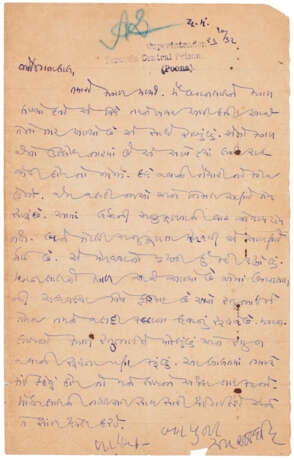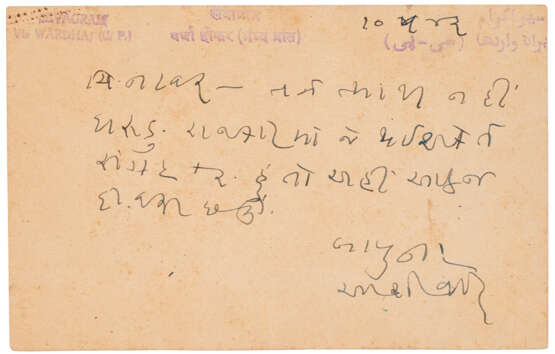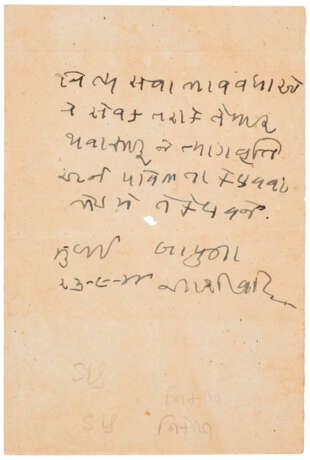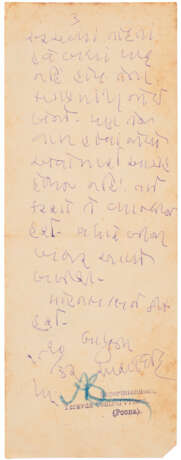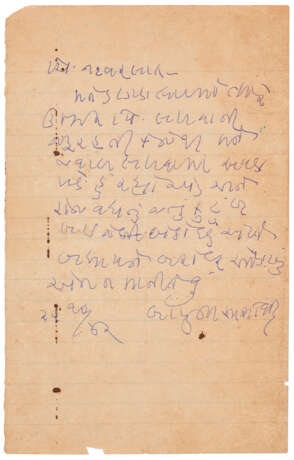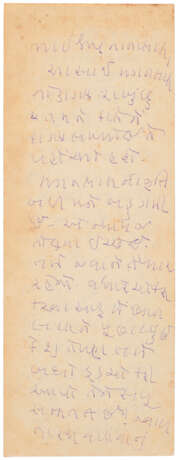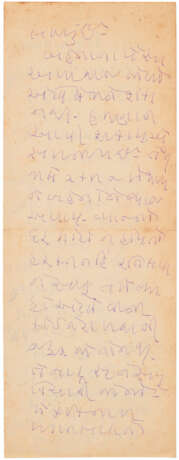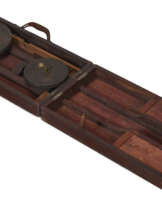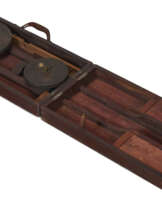ID 1236323
Lot 93 | An unpublished correspondence
Estimate value
$ 10 000 – 15 000
In Gujarati (with one secretarial letter in English). 23 pages, various sizes ranging from 140 x 88mm to 220 x 160mm (occassional foxing, minor marginal wear).
A series of unpublished letters written during the critical years of India's struggle for independence including two written from Yeravda Central Prison. Gandhi's relationship with the Jasani family began in South Africa in the early years of the last century when a member of the Khanderia family, who were close with Gandhi, married into the Jasani family, then based in Rangoon, Burma (Yangon, Myanmar). During a visit to Rangoon, Gandhi came into contact with the Khanderia daughter, and soon became close with her in-laws, the Jasanis. In 1910, the Jasanis moved to Rajkot, Gujarat where they rented Gandhi's boyhood home, the Kaba Gandhi No Delo. Gandhi visited often, where he was reported to have jokingly stated that he would live with them if the family adopted khadi in their attire—which members of the Jasani family quickly adopted. The Jasani family became deeply involved Gandhi's independence struggle during the 1930s, protesting, raising funds, while suffering arrest for their activity. Some of the letters here were written during Gandhi's own imprisonment, first in 1932, and then again during the Rajkot Satyagraha of 1938-1939.
The correspondence covers some of the most critical years of the Indian independence movement including Gandhi's internment in Yervada Central Prison after initiating a new satyagraha against British rule on his return from the Round Table Conferences in London in 1932. Writing from prison in October 1932, he advises Nanalal K. Jasani on several internal matters involving Maganlal Mehta, the son of his recently-deceased friend Pranjivan Mehta (1864-1932). Below Gandhi's signature on the two page letter is the censor stamp of the Yeravada Central Prison in Pune. Jasani, who had deep roots in Rangoon, would travel there as one of the movement's representatives at times. On 24 July 1934, Gandhi advised him, that he would not be able to "visit Rangoon…but there is no requirement…[and] don’t' have time. Only God can now send me over there." He then makes a statement on religious and ethnic unity, and adds, "Don’t' worry about my fast. God will fill that." A 27 August 1941 letter to Natwar Jasani makes a reference to Gandhi's statement opposing the "Indo Burma Immigration Agreement" (24 August): "I received your letter. I think the people's message won't be reached here. You must have read about my statement. You did a good thin by coming here. You can back whenever you wish." While many of the letters appear to concern Gandhi's attempts to mediate internal disagreements within the independence movement, others offer simple advice. In 1934 he writes that "bad thoughts can be stopped if you can keep your mind on positive things, and while writing from Mumbai in September 1944, Gandhi advises his correspondent to "serve the other with pure heart and sacrifice…." Overall, a superb collection of unpublished correspondence worthy of further research. Provenance: Natwaral B. Jasani, Nanalal K. Jasani – by descent to the consignor.
| Artist: | Mahatma Gandhi (1869 - 1948) |
|---|---|
| Genre: | Religious genre |
| Place of origin: | India |
| Auction house category: | Letters, documents and manuscripts |
| Artist: | Mahatma Gandhi (1869 - 1948) |
|---|---|
| Genre: | Religious genre |
| Place of origin: | India |
| Auction house category: | Letters, documents and manuscripts |
| Address of auction |
CHRISTIE'S 8 King Street, St. James's SW1Y 6QT London United Kingdom | |
|---|---|---|
| Preview |
| |
| Phone | +44 (0)20 7839 9060 | |
| Buyer Premium | see on Website | |
| Conditions of purchase | Conditions of purchase |
